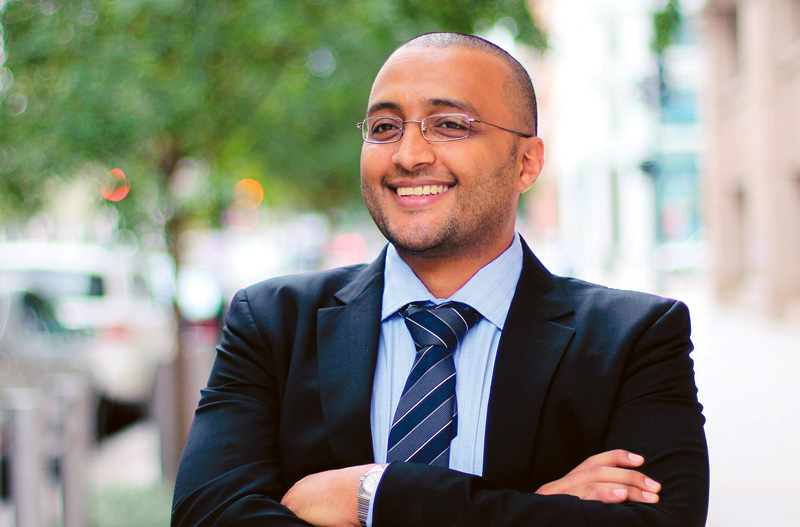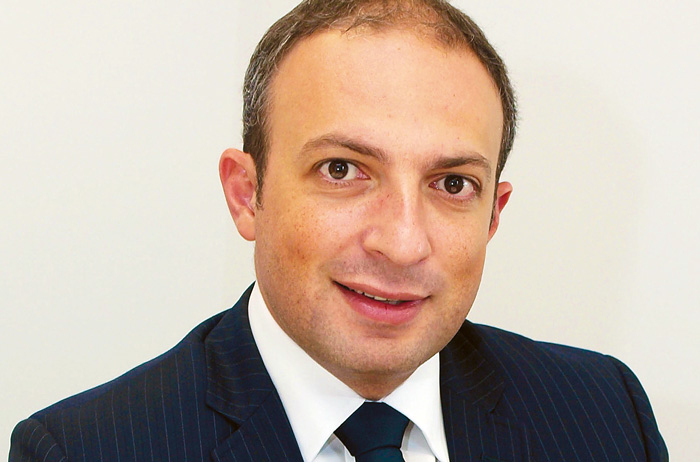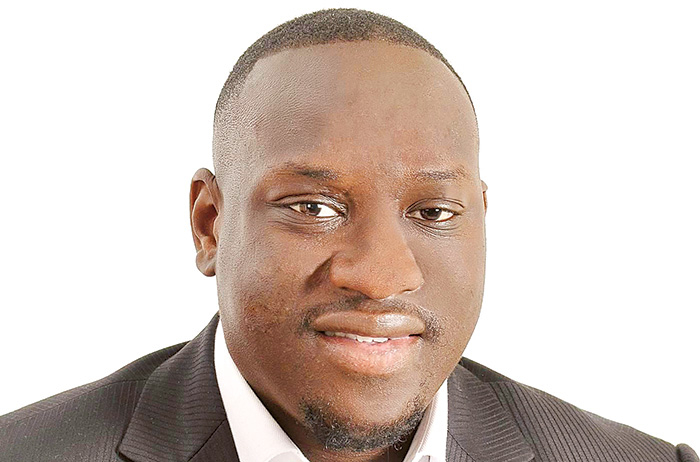Ahmad Al Kabab
Business success depends on finding a unique product. Ahmad Al Kabab interpreted that adage with an up-to-date solution. His business, Frenzy Brands, is an online multimedia company that lets organisations interact and build connections with consumers through positive engagement. The Frenzy Brands app asks users to watch short ads, after which they play a skill game in return for possible prizes.
“Our marketing platform is mainly focused on finding a sweet spot where businesses and consumers collaborate and benefit in a positive, engaging environment,” the 36-year-old Yemeni company founder says. The app launched in February and there are currently more than 4,000 users and nine active promotions running, with a focus on the UAE and Saudi Arabia. The company has so far had over 60 winners globally.
The Sandhurst graduate says the idea sparked while he was thinking about why people tend to block digital advertising using ad-blocking software. It can cost a fortune to create a great commercial in the hope consumers will watch it, so why not attract consumers towards the ad with the chance to win a prize?
“I have enjoyed coming up with creative marketing concepts, but faced limitations with execution,” says Al Kabab. “The only way those ideas would see light of day was by opening my own business and let people directly judge them.”
The company is incorporated by Tecom in Dubai Media City. As part of Dubai’s ICT innovation hub in5, Al Kabab says he has had amazing support from Tecom, and many of the usual challenges facing start-ups in the UAE have been eased. “When we approached in5 with our idea online, we were surprised by its quick response and were invited to pitch the idea to a professional panel. On becoming In5 members, we quickly noticed the great benefits and commitment in5 has put towards easing our establishment and eliminating the usual start-up obstacles.”
With an initial personal investment of $25,000 (Dh92,000) to build a viable product, it took about six months to develop the platform, Al Kabab says. He expects to break even by end of this year.
Al Kabab’s advice to entrepreneurs: “Every skill counts, learn its basics and if you enjoy it then learn more about it, never give up on learning and exploring something new everyday. And be careful how you interpret events in your business as you may find opportunities where others find disappointments.”
Bani Haddad
Bani Haddad launched Aleph Hospitality, a third-party hotel management company, in Dubai in March. The concept allows a hotel owner to appoint a specialist management company to operate the hotel, as well as take a franchise from a major chain to secure an international brand.
“By establishing a credible third-party hotel management solution for the Middle East and Africa [MEA], our aim is to open doors that were previously closed,” says the managing director and company founder. “Hotel companies, consultants and owners that we’ve spoken to across the region have all been extremely positive about the accelerated growth this model could bring.”
As a service company, he says start-up costs have been relatively low. “We spent less than $400,000 to set up the company and office and get the basics up and running.”
Haddad’s website serves as an entry point for the company while explaining the concept of third-party management, which, despite being relatively unknown in the region, is widely tipped to fuel significant future expansion in the MEA hotel industry. The company is already seeing strong demand for its services, he says. The DMCC-based Aleph plans to open its first property, the 116-room Best Western Addis Ababa, in Ethiopia next month. By end of year the company expects to also be operating in Kenya, Nigeria and Saudi Arabia.
Haddad, a 40-year-old Lebanese-French hospitality veteran who has worked with the Starwood and Wyndham brands, chose a base in the UAE because its unparalleled location as a geographic node allows companies to service MEA. “Logistically, Dubai is ideally placed and has the perfect infrastructure for any company looking to serve multiple African nations,” he says.
For international companies such as Aleph, it’s important to examine the dynamics of each operational market on its own merit. “Our criteria included considerations such as GDP growth, population size, political and economic stability, and the government’s vision and planning,” he says.
Haddad’s advice to entrepreneurs: “It’s important to be patient and respect the local culture and knowledge base. Take your time to do your due diligence and understand market specifics.”
Tohib Iyiola
The UK-based Citigate Commodities opened its Dubai office in the UAE a year ago. Founded by four partners, its growth strategy and expansion have been key to its development as a leading commodity trading house and mineral-based development and acquisition company. The four-year-old company is headquartered in DMCC.
“The DMCC free zone serves as a key platform to cater to the surrounding nations by utilising the Silk Route to its maximum benefit,” says Tohib Iyiola, one of the founding partners, referring to a section of the historic trade route between Europe and China that passed through Dubai.
“We are able to provide most major commodity markets with our expertise within the hours of a working day, and access the entire GCC and Africa by positioning ourselves in a global market hub such as Dubai.”
Providing direct access to African markets also allows Citigate to bridge the gap with the GCC.
“We provide a platform and structure investment vehicles that [offers] security, flexibility and transparency to access the vast mineral resources in Africa,” he explains. “We have presented the diamond mining industry in an innovative way, which has never been done before.”
As a British-born African, Iyiola feels his knowledge of local culture has left him perfectly placed to capitalise on the continent’s abundance of natural resources. He and his partners bootstrapped the company and broke even in the early stages of operations. Early successes include the acquisition of fertile gold and diamond mining assets in West Africa.
Three years into operations, they realised the opportunity in the Gulf. Iyiola says the UAE offers some of the finest systems in setting up a company related to this industry. “We have not faced any negative challenges while setting up business in Dubai,” he adds.
Looking ahead, although global markets appear to resound with negativity, Iyiola says the outlook for companies such as his remains bright. “Demand is rising exponentially and investment is being poured into this sector after the crumbling oil and gas sector,” he says.
Iyiola’s advice to entrepreneurs: “Personal and business development work hand in hand.”
















